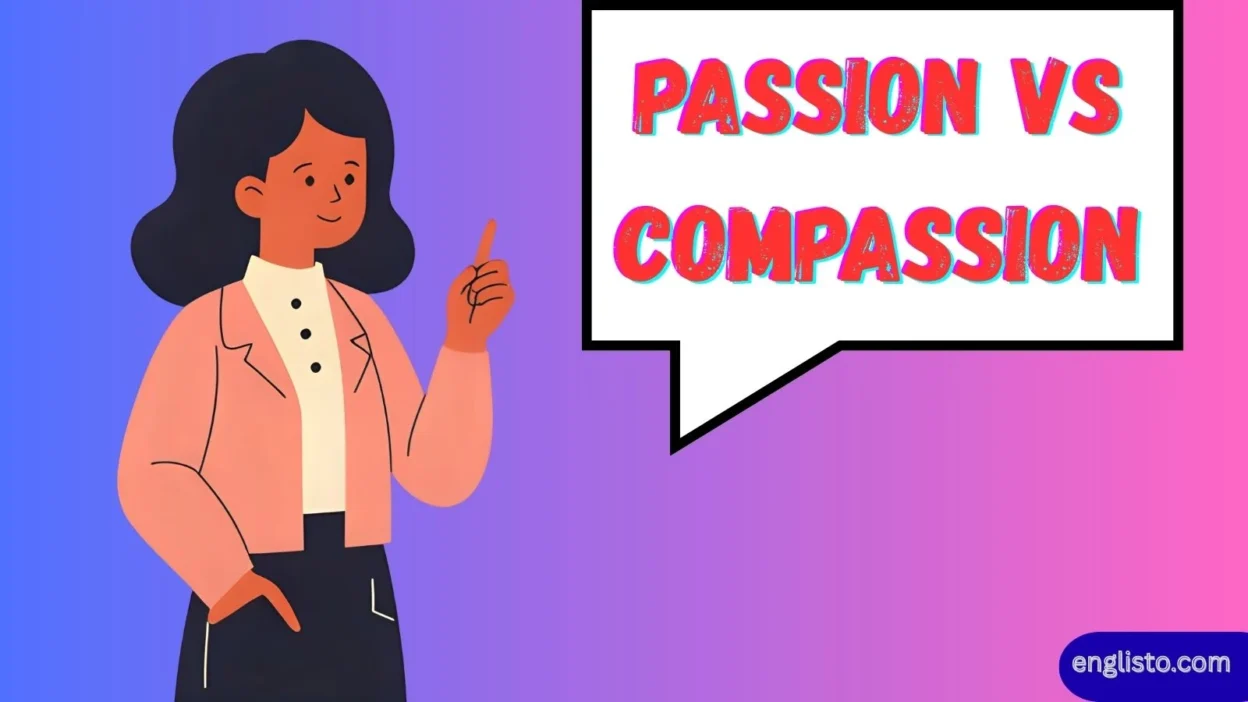Human emotions are powerful forces that shape our lives, relationships, and even societies. Among the most significant yet often confused emotions are passion and compassion. Both words carry a tremendous weight in our language and culture, and although they may sound similar, they refer to two very different inner drives. Passion vs Compassion.
Passion is the fire within—the strong, sometimes overwhelming enthusiasm or desire that pushes someone to pursue goals, dreams, or even relationships. Compassion, on the other hand, is a heartfelt concern for someone else’s pain, combined with the willingness to help alleviate it.
While one is fueled by personal drive and intensity, the other thrives on empathy and kindness. Yet, both are essential to creating a balanced, meaningful, and fulfilling life. This article takes a deep dive into Passion vs Compassion, breaking down their definitions, origins, real-world applications, and the nuanced role they play in personal growth, professional success, and human connection.
The Roots of the Words: Passion and Compassion
Words carry history, and understanding their origins gives us a richer perspective.
| Term | Origin | Meaning | Key Root |
| Passion | From Latin pati meaning “to suffer” → Old French passion → Middle English | Originally referred to the suffering of Christ during the crucifixion | patior → Proto-Indo-European root peh (“to hurt”) |
| Compassion | From Latin prefix com- (“with, together”) + pati (“to suffer”) | Literally translates to “suffer with” | compati |
Passion was once strongly tied to suffering, especially in Christian tradition (e.g., The Passion of Christ referring to Jesus’ crucifixion). Over centuries, it evolved into its modern meaning of intense desire, enthusiasm, or devotion—whether for a hobby, cause, or person.- Compassion, on the other hand, kept closer to its root: the ability to empathize with someone’s pain and walk alongside them in their hardships.
This distinction between burning desire (passion) and suffer-with empathy (compassion) explains why people often confuse but shouldn’t interchange the two.
Read More: Auxiliary vs Auxillary: The Definitive Guide to Understanding the Correct Spelling and Usage
Defining Passion
Passion is an intense, driving force within an individual. It can manifest as:
- Creative drive: A musician practicing guitar for hours daily like John, whose love for music turns into a lifelong profession.
- Romantic energy: The butterflies on a first date, the yearning for a kiss on the second night, the overwhelming desire to connect deeply with another person.
- Professional dedication: A lawyer passionately defending clients, a chef pouring heart into every dish, or an athlete training relentlessly for a championship.
Passion is not passive. It is active, energetic, and often risky. It fuels commitment, sacrifices, and dream-chasing.
Characteristics of Passion:
- Strong and intense
- Sometimes excessive or overwhelming
- Rooted in desire or devotion
- Can be directed toward an idea, activity, or person
- Has the power to inspire, but also to consume
“Passion is energy. Feel the power that comes from focusing on what excites you.” — Oprah Winfrey
Defining Compassion
Compassion is the ability to feel with someone else and take action to help alleviate their suffering. It goes beyond sympathy (feeling sorry for someone) and empathy (feeling with someone) because it includes a willingness to act.
Examples of compassion in daily life:
- A doctor offering comfort to patients alongside medicines.
- Diane buying a McDonald’s burger for a homeless woman who hasn’t eaten in days.
- A student volunteering at a shelter to support marginalized communities.
- Parents reading a storybook to their kids with warmth and attention, creating an emotional bond.
Characteristics of Compassion:
- Warm, kind, and nurturing
- Rooted in understanding and concern for others
- Includes action—helping, assisting, comforting
- Brings peace, joy, and resolution to others’ struggles
- Cultivated as a virtue in religious, spiritual, and cultural traditions
Biblically, compassion reflects the teachings of Jesus, who showed mercy and alleviated afflictions. Spiritually, it is a virtue that promotes altruism and strengthens communities.
Passion vs Compassion: A Side-by-Side Comparison
| Aspect | Passion | Compassion |
| Root | Latin pati = “to suffer” | Latin com-pati = “to suffer with” |
| Nature | Intense desire, devotion, or enthusiasm | Empathy, kindness, and willingness to help |
| Direction | Inward (personal goals, desires, drives) | Outward (towards others’ needs, pain, suffering) |
| Emotion | Energetic, enthusiastic, sometimes overwhelming | Warm, sympathetic, and nurturing |
| Examples | Playing guitar, pursuing law, romantic love, business success | Volunteering, donating, comforting, nursing care |
| Risk | Can lead to obsession, burnout, or imbalance | Can lead to emotional exhaustion if boundaries aren’t kept |
| Outcome | Fuels personal success, creativity, achievements | Strengthens relationships, fosters community, alleviates pain |
Both are essential human forces, but they operate in different directions. Passion focuses on self-expression and achievement, while compassion emphasizes connection and healing.
How Passion Impacts Life
Passion can be a double-edged sword.
Positive Impacts:
- Motivation and Drive: Passion fuels perseverance even in hardships.
- Creativity and Innovation: Passion ignites originality in arts, business, and science.
- Fulfillment: Pursuing what you love leads to purposefulness.
Negative Impacts:
- Obsession: Excessive passion can turn into unhealthy attachment.
- Frustration: When passion meets obstacles, it may result in anger or despair.
- Neglect: Passion may cause someone to ignore relationships, health, or balance.
Think of a passionate athlete training for years. Their zeal pushes them to greatness, but without moderation, it can lead to injuries, burnout, or frustration if victory doesn’t come.
How Compassion Impacts Life
Compassion enriches both the giver and the receiver.
Positive Impacts:
- Stronger Relationships: Compassion builds trust, love, and camaraderie.
- Alleviation of Suffering: Acts of compassion bring concrete relief.
- Community Growth: Compassion promotes volunteering, charity, and collective well-being.
Challenges:
- Compassion Fatigue: Too much emotional investment without self-care can drain individuals (common in nursing and caregiving professions).
- Boundaries Needed: Compassion must be balanced with self-preservation.
For instance, doctors and nurses often embody compassion by comforting patients beyond medical treatment. Yet, they also face burnout if they don’t manage their own mental health.
Passion and Compassion in Balance
The most fulfilling lives often blend passion and compassion. Passion drives personal growth, while compassion ensures that growth contributes positively to others.
- A passionate musician (passion) using concerts to raise funds for homeless shelters (compassion).
- A compassionate teacher (compassion) who loves the art of teaching itself (passion).
- A lawyer passionately advocating for justice while also empathetically supporting marginalized clients.
Together, they create a synergy of personal fulfillment and collective well-being.
Real-Life Examples
- Michael’s Donation: A passionate businessman in Arkansas, Texas, used his wealth to donate to victims of a natural tragedy, blending passion for success with compassion for humanity.
- Tom’s Speech in India: A lawyer passionately defended clients, yet showed compassion by offering free legal advice to struggling individuals.
- Diane’s McDonald’s Burger: A simple act of compassion that alleviated an immediate need—hunger.
These stories highlight how both forces can work separately and together, shaping lives meaningfully.
Passion vs Compassion in Cultural and Religious Contexts
- Christianity: Passion represents Christ’s suffering, while compassion reflects His mercy toward humanity.
- Buddhism: Compassion (karuna) is central to relieving suffering, while passion, if uncontrolled, may be seen as attachment.
- Modern Society: Passion fuels careers, innovations, and personal goals, while compassion creates humanitarian aid, charities, and social justice movements.
Both are essential for building cultures that value achievement and humanity.
Language Nuances: Grammar and Usage
People often confuse passion and compassion, using them interchangeably. Understanding their correct usage improves clarity in communication.
| Word | Part of Speech | Correct Usage | Example Sentence |
| Passion | Noun | Intense enthusiasm, desire, or devotion | “She has a passion for painting.” |
| Compassion | Noun | Concern for others’ suffering with a desire to help | His compassion for the needy led him to volunteer weekly |
Phrases to Remember:
- Passionate about (correct) → “He’s passionate about cricket.”
- Compassionate toward (correct) → “She is compassionate toward children with autism.”
FAQs
What is the main difference between passion and compassion?
Passion is about personal intensity and desire, while compassion is about empathizing with others’ suffering and taking action to help.
Can a person have both passion and compassion?
Yes, and the most balanced individuals often blend them. Passion fuels purpose, while compassion ensures that purpose benefits others.
Is compassion more important than passion?
Neither is superior. Passion drives personal success, while compassion fosters human connection. Together, they create harmony.
How do I cultivate compassion in daily life?
Practice empathy, volunteer, actively listen to others, and take small but meaningful steps to ease someone’s burden.
How can passion turn negative?
Excessive passion may lead to obsession, frustration, or neglecting other important areas of life like health or relationships.
Conclusion
The debate of Passion vs Compassion isn’t about choosing one over the other—it’s about recognizing their distinct roles. Passion gives life its drive, energy, and creative spark. Compassion gives life its warmth, connection, and healing power.
When combined, they create a powerful balance: passion to pursue dreams and compassion to make those dreams meaningful for others. In a world often caught between ambition and empathy, the wisest path is to ignite your passion while nurturing compassion.



